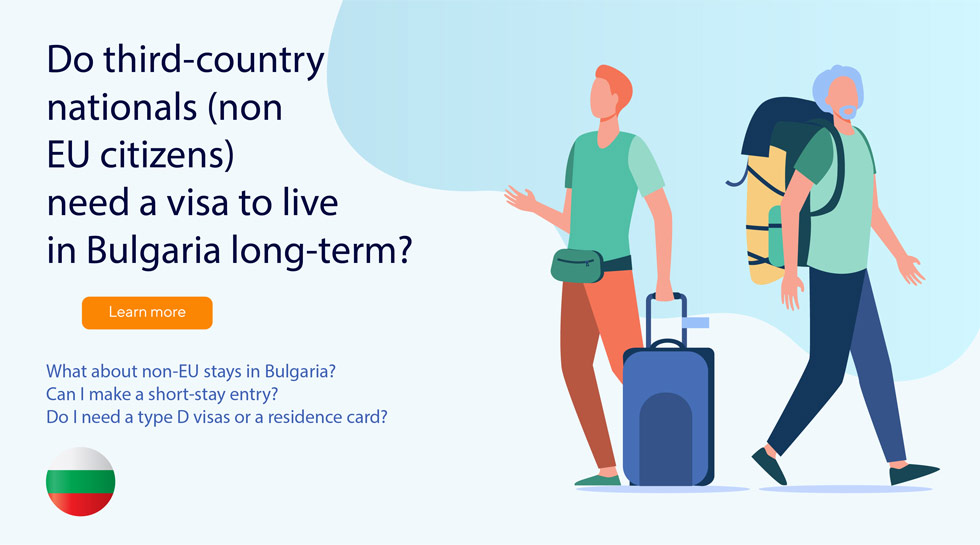Short stays: Many non-EU nationals (e.g., from the USA, Canada, Australia, etc.) do not need a visa to visit Bulgaria for up to 90 days. However, any non-EU citizen who wishes to remain in Bulgaria for more than 90 days must obtain a Type D long-stay visa and a residence permit (MFA). In other words, a visa is not required for short tourist/business visits if you’re from a visa-exempt country, but it is necessary for long-term living in Bulgaria.
From 12 Oct 2025, the EU’s EES replaces passport stamping at Schengen external borders; see the FAQ below for details.
“Third-country nationals” refers to citizens of countries outside the EU/EEA/Switzerland. Bulgaria’s policy distinguishes between visa-exempt and visa-required countries (see the next section for developing countries). If you hold a passport from a country on the EU’s visa-waiver list (Annex II of Reg. 2018/1806) – for example, the United States, Canada, United Kingdom, Australia, Japan, South Korea, etc. – you can enter Bulgaria without a visa for short stays of up to 90 days within 180 days (travel.state.gov). Your passport must be valid 3+ months beyond your stay, and you may be asked to show a return ticket and travel medical insurance at the border (travel.state.gov and travel.state.gov). Importantly, as of 2024, Bulgaria has joined the Schengen area’s visa policy – time spent in Bulgaria now counts toward the Schengen 90-day limit, and Bulgaria issues Schengen visas rather than national visas.
For any stay longer than 90 days, or if you intend to live, work, or study in Bulgaria, you will need to secure a Long-Stay D Visa first (MFA). This visa is typically valid for 6 months (with single or multiple entries) and is a prerequisite for obtaining a Bulgarian residence permit. To get a Type D visa, you must have a reason allowed by Bulgarian law – common grounds include: employment in Bulgaria (requires a work permit or highly-skilled EU Blue Card), enrolling in a Bulgarian university, business investment or company registration, family reunification with a resident or citizen, retirement with sufficient funds, or the new digital nomad category. Each category has specific documentation (e.g., work contract and work permit, university acceptance letter, marriage certificate for spouses, etc.). The visa D application is submitted at a Bulgarian consulate and typically takes a few weeks to process. It allows you to enter Bulgaria and then apply for a residence permit at the Migration Directorate (MFA and MFA).
Upon arrival with the D visa, you must apply for a residence permit (also known as “continuous” or “extended” residence) within 7–14 days. The initial residence permit is often valid for 1 year (or the remainder of any work contract) and can be renewed annually if conditions persist. After 5 years of continuous residence on temporary permits, you can apply for permanent residency (which has an indefinite term) (Home-affairs.ec.europa.eu). Permanent residents enjoy almost all the rights of citizens except voting, and they no longer need to renew permits. Eventually, permanent residents may qualify for Bulgarian citizenship (typically after five years as a permanent resident, or a total of approximately ten years of residency, unless they are married to a Bulgarian, which shortens the requirement).
If you are a non-EU national from a visa-waiver country, you can visit Bulgaria visa-free for short periods. However, if you plan to reside in Bulgaria for more than 90 days, you must obtain a long-stay visa and subsequently a residence permit under one of the permitted categories (MFA). Those from countries that generally require a visa even for short visits face the exact long-term requirements (with the added requirement that even short stays require a visa). Compliance is essential: overstaying the 90-day limit without a proper visa/permit can result in fines, deportation, and temporary entry bans. Always check the current requirements with the Bulgarian authorities before planning a long-term stay.
FAQ
Does EES change whether I need a Bulgarian visa?
No—EES changes how border control is done, not who needs a visa. Visa policy stays the same; EES digitizes entry/exit and biometrics. Migration and Home Affairs
Will I see EES when flying to Sofia from outside the Schengen area?
Yes—Sofia Airport (external arrivals) will use EES during the roll-out window. If you first land in another Schengen country, you’ll register there. Migration and Home Affairs
When does stamping actually stop?
By 10 April 2026, across the Area, some posts may stop earlier during the transitional months. Consilium
More Information:
- Bulgarian Ministry of Foreign Affairs – Visa Information: Official list of which nationalities require a visa and which are visa-exempt for short stay – Web: MFA.
Also outlines the 90/180-day rule and passport validity requirements for visitors. - U.S. State Department – Bulgaria Entry Requirements: Confirms the visa-free 90-day stay for U.S. citizens and the need for a visa for more extended stays – Web: Travel.state.gov and Travel.state.gov, applicable similarly to other visa-waiver country nationals.
You Will Also Like To Know About:
- Do third-country nationals (non-EU citizens) need a visa to live in Bulgaria long-term?
- Do UK nationals need a visa to live in Bulgaria after Brexit?
Legal Disclaimer: The information in this article (part of the Stay in Bulgaria FAQ series—EU/EEA/Swiss citizens, UK nationals, third-country nationals, citizens of developing countries, digital nomads, and family members of Bulgarian citizens) is for general informational purposes only and does not constitute legal advice. It does not create an attorney-client relationship. Laws and procedures (including Schengen/90-day rules, Type D visas, residence permits, and related EU/Bulgarian regulations) are subject to frequent changes; therefore, content may be incomplete or out of date. External links are provided for convenience; we are not responsible for their content. For advice tailored to your situation, consult the Migration Directorate (Ministry of Interior), the Ministry of Foreign Affairs, or a licensed immigration attorney. Last updated: October 2025.



